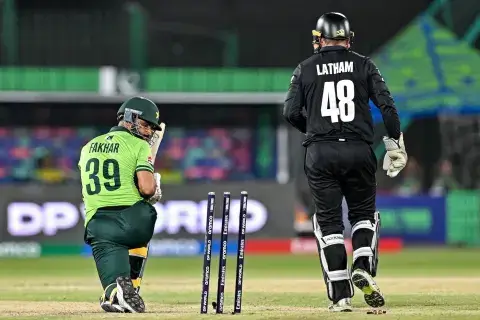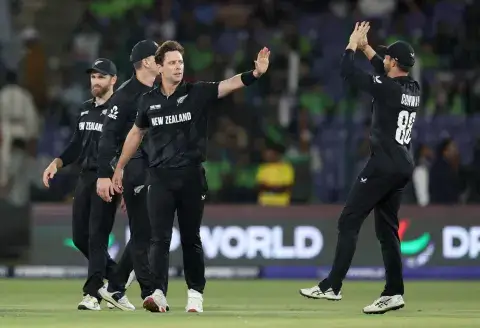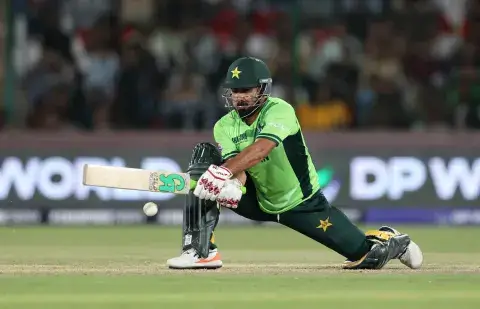New Zealand showcased a dominant performance against Pakistan in the Champions Trophy 2025. Their excellence in fielding, batting, and teamwork made a difference. Glenn Phillips’ spectacular catch set the tone early, keeping Pakistan to their lowest Powerplay score in six years. Will Young’s masterful century and Tom Latham’s composed innings guided New Zealand to a strong total.
Pakistan started well but suffered from poor fielding and a lack of partnerships. Babar Azam’s slow innings of 64 off 90 balls hurt their chase. New Zealand’s tactical bowling changes and disciplined game plan ensured Pakistan never recovered. This game reinforced New Zealand’s ability to perform as a unit without relying on individual brilliance. With this win, Pakistan now faces the risk of an early exit, while New Zealand strengthens its position in the tournament.
7 Key Highlights From The Match
1. Glenn Phillips’ Stunning Catch Sets the Tone
Glenn Phillips produced a breathtaking catch that shocked Mohammad Rizwan and Pakistan. Rizwan’s late cut seemed safe, but Phillips launched himself left at full stretch. He grabbed the ball with his non-dominant hand, displaying incredible reflexes. This dismissal came off the last ball of the Powerplay, keeping Pakistan to just 22 runs in 10 overs.
The catch showcased New Zealand’s fielding superiority, which played a crucial role. Pakistan’s batting struggled under pressure, and they could not recover from the early setback. It also highlighted the stark contrast between both teams’ fielding standards, like the UP Warriors game in WPL 2025. This moment set the aggressive tone for New Zealand, ensuring Pakistan never gained momentum. Phillips’ effort will be remembered as one of the best catches in the tournament. His commitment reflected New Zealand’s winning mentality and relentless energy on the field.
2. Will Young’s Century Anchors New Zealand’s Innings
Will Young silenced critics with a spectacular century under pressure. Before this match, he had only 38 runs in three games, raising doubts over his form. But he responded in style, playing a measured yet dominant innings.
Young started aggressively, scoring 44 off 43 balls, before switching to a calculated approach. In the middle overs, he adapted, taking only 32 runs off the next 43 balls. Pakistan tried to target him with pace, but he stayed composed. He brought up his century with a sweep against Abrar Ahmed, marking his first international hundred overseas. His partnership with Tom Latham stabilized New Zealand, giving them a formidable total of 280. This innings proved why New Zealand trusts its players despite rough patches. Young’s resilience and ability to adapt under pressure were key factors in their victory.
3. Tom Latham’s Composed Knock Guides New Zealand
Tom Latham once again proved his class in crunch situations. Partnering with Will Young, he provided stability and experience to New Zealand’s innings. Latham started cautiously but grew into the innings, rotating strikes and punishing loose deliveries like RCB’s dominating performance in WPL 2025.
When Pakistan brought back Shaheen and Naseem for breakthroughs, Latham and Young absorbed the pressure. In a 30-ball spell, they played only six attacking shots but still scored 26 runs. This patience frustrated Pakistan’s bowlers, forcing them into errors.
Latham’s century came at a crucial moment, ensuring New Zealand reached a match-winning total of 280. His ability to handle pressure and build critical partnerships made a difference. Pakistan’s bowlers lacked variety to trouble the composed New Zealand duo. Again, Latham’s calmness and strategic mindset proved vital for New Zealand’s success.
4. Pakistan’s Powerplay Struggles & Poor Start
Pakistan’s Powerplay struggles continued as they recorded their lowest score in six years. The opening 10 overs saw them crawl to 22 runs, unable to counter New Zealand’s sharp bowling. Fakhar Zaman’s early injury forced a batting reshuffle, weakening their start.
With the fielding restrictions in play, Pakistan failed to rotate strikes or find boundaries. Shaheen and Naseem kept the pressure on, but Pakistan lacked intent. The poor start increased pressure on Babar Azam and Mohammad Rizwan, making acceleration difficult.
New Zealand capitalized on Pakistan’s hesitant approach, setting the tone for its dominance. By the time Pakistan attempted to recover, the required rate had skyrocketed. This sluggish start hurt Pakistan’s chances, forcing them into risky shot-making later in the innings. Their inability to maximize Powerplay opportunities was a key factor in their defeat, like Delhi’s capitals in WPL 2025.
5. Babar Azam’s Slow Knock Adds to Pakistan’s Woes
Babar Azam’s 64 off 90 balls turned into a highly debated innings. While he anchored the innings, his lack of acceleration proved costly for Pakistan’s chase. New Zealand’s bowlers set defensive fields, forcing Babar into a low strike rate.
Pakistan needed aggression in the middle overs, but Babar played cautiously. New Zealand cleverly introduced spinners Michael Bracewell and Glenn Phillips early. This decision worked perfectly, as Babar’s strike rate against spin was just 67.
While he built a partnership, he failed to accelerate when required. His slow knock increased pressure on the lower order, which had too much to do. Pakistan had already lost control of the game when he tried to increase the run rate. This innings highlighted Pakistan’s overreliance on individual performances rather than teamwork.
6. New Zealand’s Tactical Bowling Chokes Pakistan
New Zealand executed a flawless bowling plan, restricting Pakistan effectively. They used match-ups intelligently, bringing in spinners early against Babar Azam. Michael Bracewell and Glenn Phillips kept Pakistan’s run rate in check, building pressure.
Mitchell Santner, New Zealand’s best spinner, wasn’t introduced until later. The team trusted its depth, ensuring bowlers were used at the right moments. Seamers attacked with short-pitched deliveries and tight lines, preventing free scoring.
Pakistan’s middle order failed to counter New Zealand’s smart field placements. Unlike Pakistan, New Zealand adapted to match situations, using resources efficiently. Their discipline and strategic execution ensured Pakistan never built momentum. This was another example of New Zealand’s well-oiled system, where every player understands their role perfectly.
7. New Zealand’s All-Round Brilliance Secures Victory
New Zealand proved to be one of the most consistent teams. Unlike Pakistan, they don’t rely on individual performances but function as a unit. When Williamson was absent, Conway stepped up. When Ravindra was ruled out, Young delivered.
Their fielding was miles ahead of Pakistan’s, with game-changing moments like Phillips’ catch. Tactical bowling kept Pakistan under pressure, ensuring they never controlled the chase. Even their captain, Mitchell Santner, downplayed individual brilliance, emphasizing teamwork like they did at Nassau County Stadium.
New Zealand identified weaknesses in Pakistan’s batting and exploited them smartly. Unlike Pakistan, they didn’t panic under pressure, showing why they are always a threat in ICC tournaments. This was more than just a win – it was a masterclass in teamwork and execution.
Conclusion
New Zealand’s clinical performance against Pakistan in the Champions Trophy 2025 reinforced their status as one of the most well-balanced teams. Every player contributed, from Will Young’s century to Glenn Phillips’ world-class fielding. Tom Latham’s leadership and calculated approach ensured New Zealand posted a winning total. Tomorrow is India vs. Bangladesh at Dubai International Stadium.
Pakistan’s slow start, fielding errors, and tactical missteps cost them dearly. Babar Azam’s slow innings added pressure, while Pakistan’s overreliance on individual brilliance hurt them. In contrast, New Zealand functioned as a disciplined, well-oiled machine, with every player contributing.
With this win, Pakistan is dangerously close to an early tournament exit. New Zealand, however, looks stronger than ever, proving why they are one of the most feared teams in world cricket.





